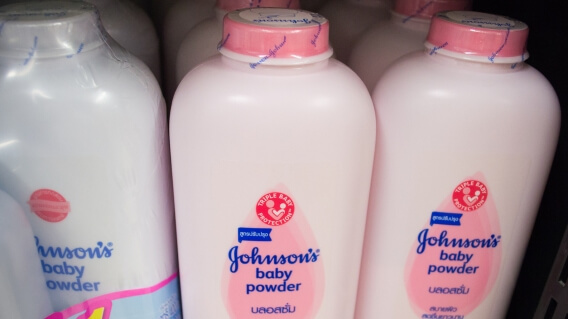Johnson & Johnson to Continue Global Sale of Talc-Based Baby Powder

Johnson & Johnson will continue selling its iconic talc-based baby powder outside the United States and Canada after shareholders rejected a proposal that would have ended its worldwide production and distribution.
The proposal failed to receive the majority vote needed at J&J’s annual meeting of stockholders last month, which was held virtually due to the COVID-19 pandemic. Ending global sales was one of 14 issues – and the most controversial – listed in the company’s proxy statement.
J&J discontinued selling Johnson’s Baby Powder throughout the U.S. and Canada in 2020 after being flooded with lawsuits claiming long-term use of its product was causing serious health issues stemming from talc contaminated by asbestos fibers.
The most serious issues involved ovarian and mesothelioma cancer. An estimated 40,000 talc lawsuits have been filed.
J&J Shareholders Have Their Say
The litigation stemming from those lawsuits already has cost Johnson & Johnson close to $1 billion in legal fees and $3.5 billion in settlements and verdicts, according to the company. At least 25,000 cases are still outstanding today.
Along with the ballot, the shareholder proposal included lengthy statements from management encouraging rejection of worldwide talc sales, and statements from proposal authors urging its passage.
“J&J remains vulnerable to further erosion of its reputation as a trusted purveyor of health-related products by continuing to sell and market its talc-based baby powder to the rest of the world,” wrote proposal author Antoine Argouges, CEO of Tulipshare Ltd. “The use of talc in personal care products is a public health concern.”
The U.S. Food and Drug Administration discovered small traces of asbestos in baby powder samples taken in 2019, which prompted a partial recall. Less than a year later, Johnson & Johnson suspended sales of the talc-based product in the U.S. and Canada.
“This is no longer a political, or legal, or consumer problem,” Argouges wrote. “This is a shareholder problem.”
Johnson & Johnson Says Talc Baby Powder Is Safe
Johnson & Johnson has continued to insist its product is safe, attributing the stoppage of sales to exaggerated reports of contamination, legal ramifications and lagging interest in the product. It insists that its regular testing of talc has proven there is no toxic asbestos contamination.
Talc, a naturally occurring mineral, is often mined near asbestos deposits close to the Earth’s surface, increasing the risk of asbestos contamination.
“The company continues to use cosmetic talc in Johnson’s Baby Powder because decades of science have reaffirmed its safety,” management wrote in its opposition to the proxy proposal. “Decades of independent scientific testing has confirmed that JBP [Johnson’s Baby Powder] is safe and is not contaminated with asbestos.”
Johnson & Johnson, one of America’s richest companies, has a market share estimated at $450 billion. A major reason for its desire to continue marketing its talc-based baby powder was its recent ability to create a new subsidiary to separate assets from liabilities.
The newly created entity, called LTL Management LLC, immediately filed for bankruptcy protection. A federal judge in New Jersey approved the Chapter 11 bankruptcy plan in February. J&J will now avoid a much more costly and drawn-out route of litigating individual lawsuits.
Although details of the bankruptcy filing are still ongoing, LTL Management has listed its net worth at $10 billion, along with $10 billion in liabilities. Johnson & Johnson has set aside an additional $2 billion to be distributed through the pending bankruptcy trust.
“These actions are not a concession of liability, but rather a means to achieve an equitable and efficient resolution of the claims raised in the talc litigation,” management wrote in the proxy. “The claims are premised on the allegation that talc causes ovarian cancer and mesothelioma, a position that has been rejected by independent experts.”